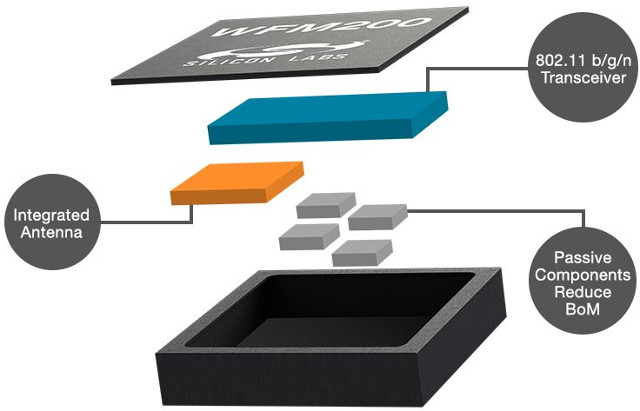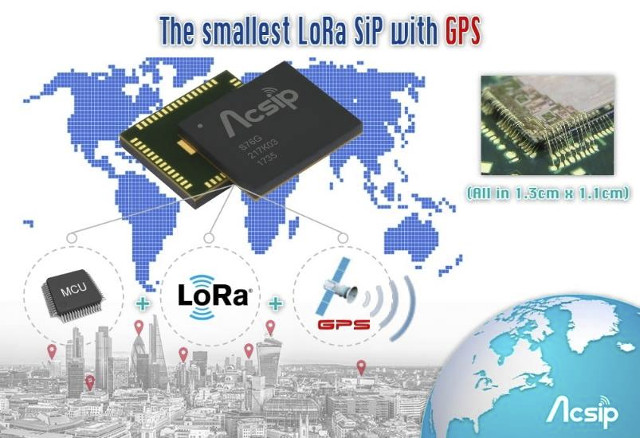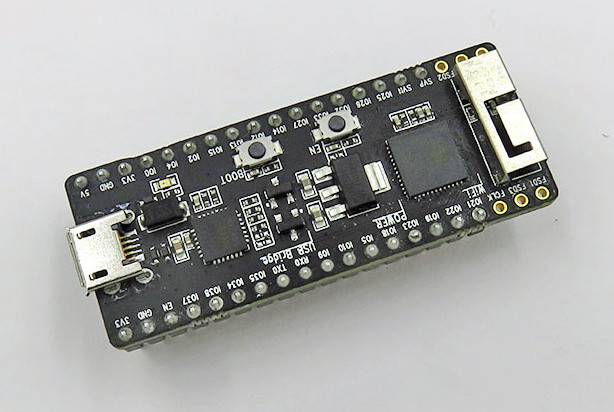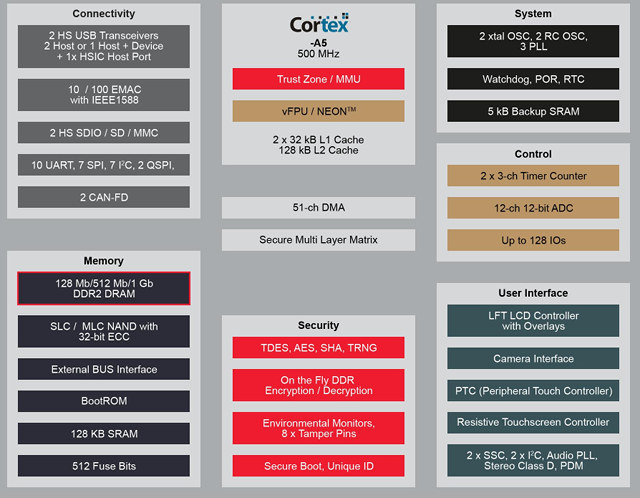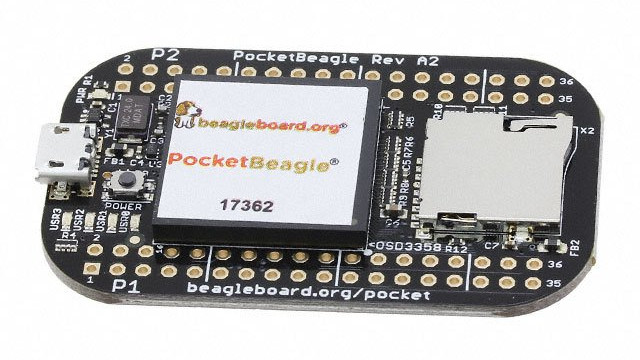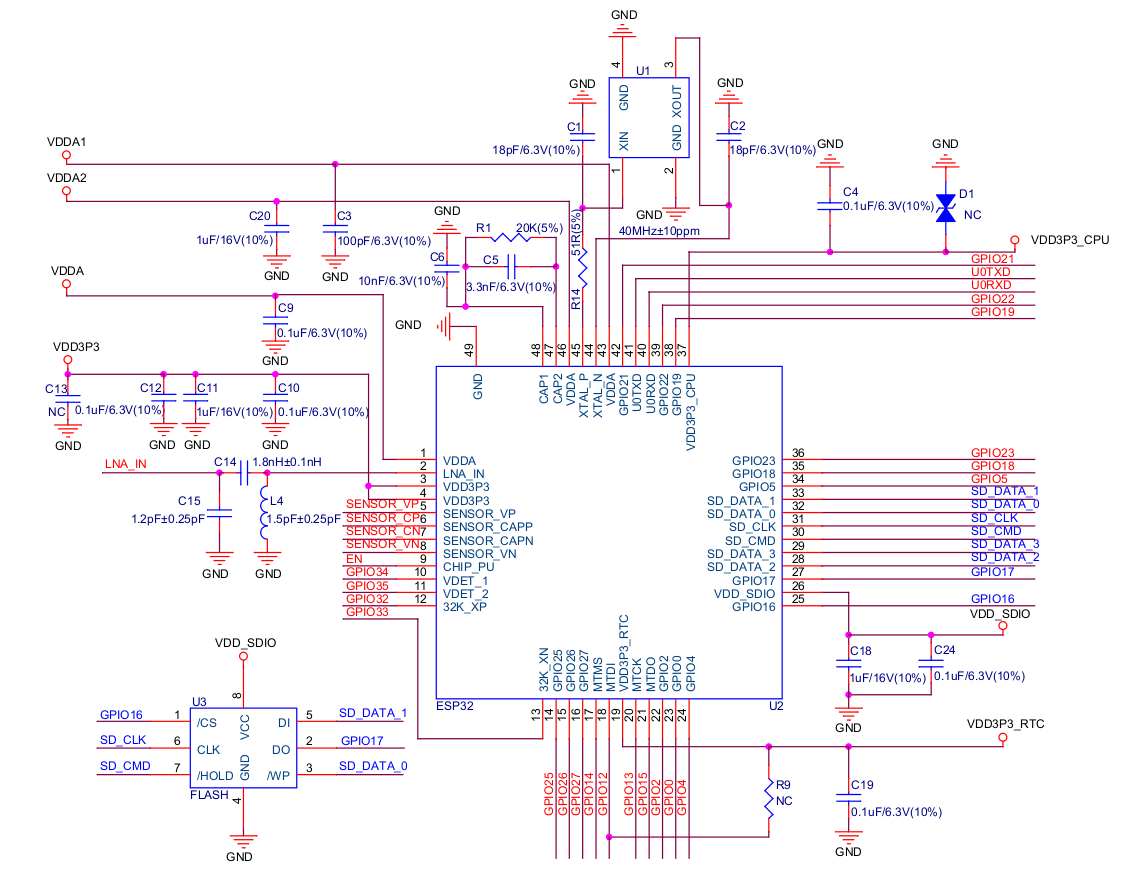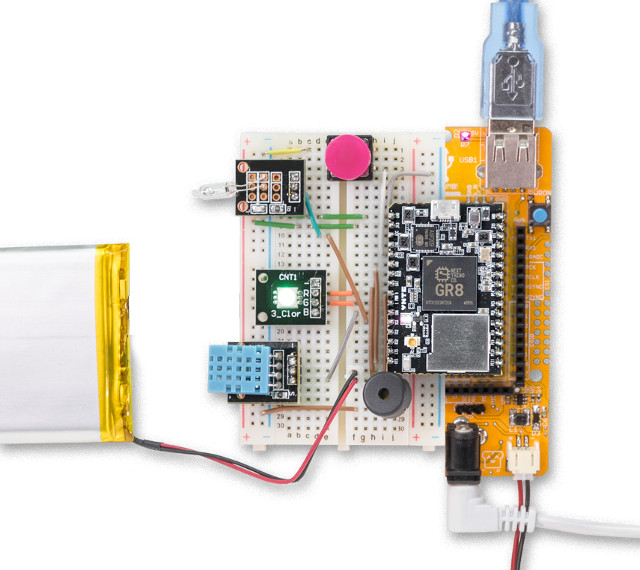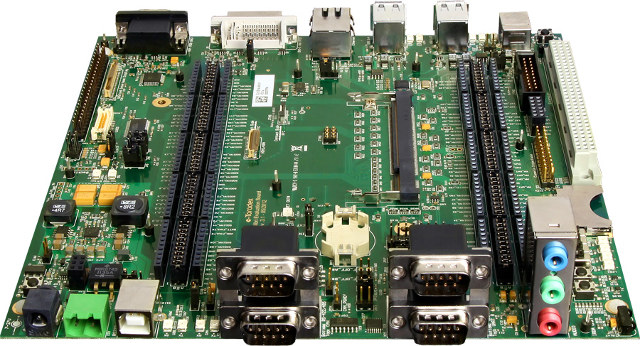When it comes to power consumption, WiFi is not the best wireless standard around, and even the most power efficient WiFi SoCs/modules consume several times the power required for Bluetooth LE Tx or Rx. Yet we still have plenty of battery powered devices relying on WiFi, so companies are working on improving efficiency, and Silicon Labs has recently announced the WF200 transceivers and WFM200 modules that support 2.4 GHz 802.11 b/g/n Wi-Fi and are said to slash power consumption in half. WF200 / WFM200 highlights: Low transmit (Tx: 138 mA) and receive (Rx: 48 mA) power 200 µA average Wi-Fi power consumption (DTIM = 3) Link budget of 115 dBm for long-range Wi-Fi transmissions Excellent antenna diversity and wireless coexistence in crowded 2.4 GHz environments Security – Secure boot and host interface, hardware cryptography acceleration supporting AES, PKE and TRNG Packages – 4 mm x 4 mm QFN32 transceiver and […]
AcSiP S76G/S78G SiPs Integrate LoRa, GPS, and MCU into a Single 1.3×1.1 cm Package
LoRa has been combined with GPS in several products such as Rakwireless RAK811 LoRa tracker board, or Dragino LoRa/GPS HAT board among others, with all designed for far based on a LoRa module, plus a GPS module. LoRa GPS tracker will soon even smaller as AcSiP has developed S76G and S78G systems-in-package (SiP) that combine LoRa, GPS and an MCU into a single 1.1 x 1.3cm package. The two new modules are not listed on the company’s IoT-LoRa products page yet, but they appear to be an evolution of their S76S / S78S LoRa + MCU SiP released in 2016, so the new modules should have the following features: MCU – STMicro STM32L073x Arm Cortex M0+ MCU with up to 192 KB of Flash memory and 20 KB of RAM LoRa AcSiP S76G – Semtech SX1276 supporting global 868 MHz or 915 MHz ISM-Bands. AcSiP S78G – Semtech SX1278 supporting […]
ESP32-PICO-KIT v4 Board Based on ESP32-PICO-D4 SiP Now Available for $10
A little while ago, I received a bunch of ESP32 PICO Core development boards which were based on Espressif Systems ESP32-PICO-D4 system-in-package with ESP32, 4MB SPI Flash, and other components. The advantage of such chip is that is requires less external component, and allows for smaller designs. For example, the boards I received would leave two row of pin on each side of the board, while most other ESP32 boards will only expose one row on each side. I used the board to play with Micropython ESP32 port, and later-on when I launched a giveaway of 8 of the boards, I found out the name had changed to ESP32-PICO Kit, with the documentation listing v3 with all pins connected to male headers, and v4 with 6-pin not connected to a male header as shown in the photo below. Both versions of the board also have a different pin layout. But […]
SAMA5D2 Based SiPs Combine ARM Cortex-A5 Processor With Up to 128MB DDR2
Atmel SAMA5D2 ARM Cortex-A5 processor was released about two years ago with extended temperature range and lower power consumption compared to previous SAMAD5 processors, with the new SoC still targeting industrial Internet of Things (IIoT), wearables and point of sale applications. In recent years, we’ve seen companies packing main components into systems-in-package (SiP) with products such as Octavo Systems OSD3358 and Espressif Systems ESP32-PICO-D4 with integrate an existing processor with memory, storage, and/or PMIC. Microchip (previously Atmel) has now done the same for their SAMA5D2 processors with SiPs combining the Cortex A5 SoC with DDR2 memory. Four SAMA5D2 SiPs have been launched: ATSAMA5D225C-D1M based on ATSAMA5D22C MPU with extra SD/SDIO, QSPI, FLEXCOMs (2x), I2S, and timers (2x) and: 128 Mb (16 MB) DDR2 DRAM 90 Peripheral I/Os 196 BGA Package Designed for RTOS/bare metal development ATSAMA5D27C-D5M based on ATSAMA5D27C MPU with: 512 Mb (64 MB) DDR2 DRAM 128 Peripheral I/Os […]
$25 PocketBeagle is a mini BeagleBone Board based on Octavo OSD3358-SM SiP
Earlier this year, Qwerty Embedded designed PocketBone board, an Eagle & KiCad open source hardware board software compatible with BeagleBone, but much smaller and based on Octavo OSD3358 system-in-package. This was never an official BeagleBoard.org board, and AFAIK it was not made broadly available. But the BeagleBoard foundation has now introduced PocketBeagle with a similar form factor, but based instead on the latest Octavo OSD3358-SM SiP that embeds TI Sitara AM3358, 512MB RAM, a PMIC, and various passive components into a 21×21 package, and exposing more I/Os thanks to 72 through holes. PocketBeagle board specifications: SiP (System-in-Package) – Octavo Systems OSD3358-SM with TI Sitara AM3358 ARM Cortex-A8 processor @ up to 1 GHz, PowerVR SGX530 GPU, 2x PRU, ARM Cortex-M3 for power and security management functions 512MB DDR3 800 MHz 4kB I2C EEPROM TPS65217 PMIC + LDO with integrated 1-cell LiPo battery support Storage – micro SD slot USB – […]
ESP32-PICO-D4 System-in-Package Combines ESP32, 4MB SPI Flash, a Crystal Oscillator, and Passive Components
Espressif Systems has revealed another ESP32 variant, but this time it’s not an SoC, but a 7x7mm system-in-package (SIP) that comes ESP32 dual core processor, a 4MB SPI flash, a crystal oscillator and various passive components, so that you don’t need to include those in your design, and create an ultra-compact PCB for wearables and other space-constrained applications. ESP32-PICO-D4 SiP specifications: SoC – ESP32 with two Tensilica LX6 cores, 448 KB ROM, 520 KB SRAM (inc. 8KB RTC memory), 1kbit eFuse On-module Flash – 4MB SPI flash Connectivity WiFi – 802.11 b/g/n/e/i (802.11n up to 150 Mbps) Bluetooth – Bluetooth V4.2 BR/EDR and BLE specification; ; class-1, class-2 and class-3 transmitter; Audio: CVSD and SBC SIP Interfaces SD card, UART, SPI, SDIO, LED PWM, Motor PWM, I2S, I2C, IR GPIO, capacitive touch sensor, ADC, DAC, LNA pre-amplifier Sensors – On-chip Hall sensor & temperature sensor Clock – On-module 40 MHz crystal […]
CHIP Pro is a $16 WiFi and Bluetooth 4.2 System-on-Module Powered by a $6 GR8 ARM Cortex A8 SIP
Next Thing CHIP board and corresponding PocketCHIP portable Linux computer have been relatively popular due to their inexpensive price for the feature set, as for $9, you’d get an Allwinner R8 ARM Cortex A8 processor, 512MB flash, 4GB NAND flash, WiFi & Bluetooth connectivity, and plenty of I/Os, which made it very attractive for IoT applications compared to other cheap boards such as Raspberry Pi Zero and Orange Pi One. The first board was mostly designed for hobbyists, but company has now designed a new lower profile system-on-module called CHIP Pro based on Next Thing GR8 SIP combining Allwinner R8 SoC with 256MB DDR3 RAM that can be used for easy integration into your own hardware project. While the original CHIP board exposed full USB ports and interface for video signal, the new CHIP Pro is specifically designed for IoT with the following specs: SIP – Allwinner R8 ARM Cortex […]
Setting a VoIP SIP user agent with Embedded Linux
This is a guest post by Leonardo Graboski Veiga, working for Toradex. Introduction This article’s main goals are: to cross-compile the PJSIP libraries and the PJSUA API reference implementation; deploy it to the target system; give an overview about the SIP protocol; and explore the reference implementation features, regarding audio only. For this purpose, a Computer on Module (CoM) from Toradex was chosen in the following configuration: Colibri iMX6DL* + Colibri Evaluation Board. The evaluation board and CoM are displayed in Figures 1 and 2, respectively. VOIP or Voice over IP, is a term designed to refer to a set of methods and technologies targeted for the implementation of telephony services over the Internet. For the purpose of this article, the scope will be limited to the use of a reference implementation built upon the SIP communication handling protocol by means of the PJSIP libraries and PJSUA2 API. If […]


